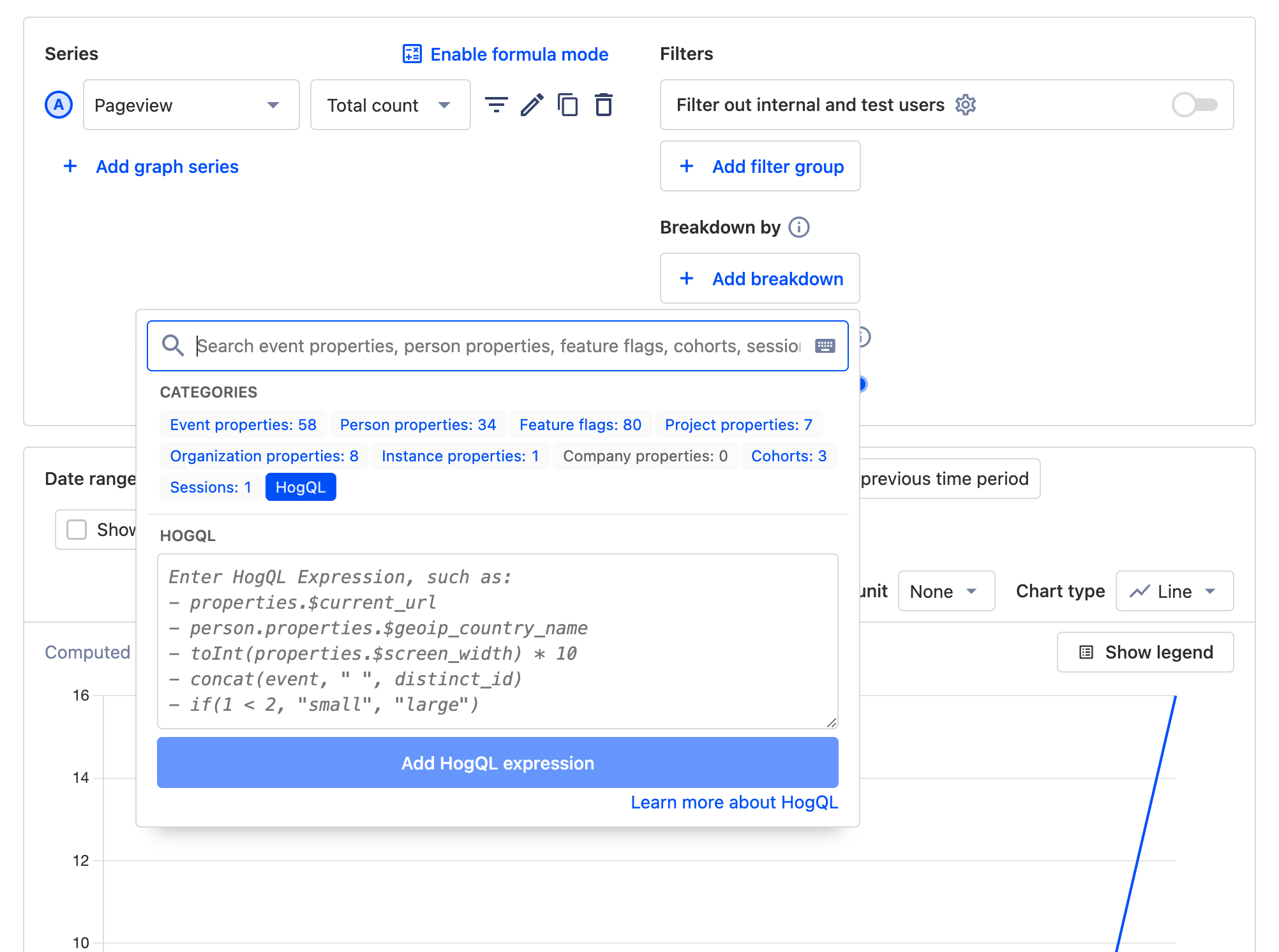HogQL expressions enable you to directly access, modify, and aggregate data in PostHog using SQL. You can use them nearly everywhere where event filters exist, including:
- Dashboards
- Data series
- Breakdowns
- Funnels
- Event explorer

HogQL expressions can access data like:
- event properties
- person properties
eventelements_chaintimestampdistinct_idperson_id
They then use SQL functions to access, filter, modify, or aggregate the data. A full list of SQL functions are found in our supported ClickHouse functions and supported aggregations docs.
Tip: If you're having trouble getting results from your expression, try debugging by using a different visualization (trends table often works best as it shows all values returned) or breaking down your expression into pieces and testing each one.
Useful functions
To help you get the most out of HogQL expressions, here are some of the most popular functions.
Comparisons
if: Checks a condition, and if true (or non-zero), and then returns the result of an expression.multiIf: Enables chaining multipleifstatements together, each a condition and return expression.in: Checks if an array or string contains a value.match: Checks whether a string matches a regular expression pattern.like: Checks if string matches pattern that contain string(s) and symbols%(arbitrary number of arbitrary characters),_(single arbitrary character),\(escaped literals).
Aggregations
count: Counts the values. If you want a condition, usesumIf.count(distinct): Counts the number ofuniqExactvalues.uniq: Calculates the approximate number of different values (uniqExactis slower but exact).uniqExact: Calculates the exact number of different argument values (uniqis faster and you should use it if a close approximation is good enough).sum: Calculates the total (sum) numeric value.sumIf: Calculates the total (sum) numeric value for values meeting a condition.avg: Calculates the average numeric value.median: Computes an approximate middle (50%) value for a numeric data sequence.
Strings
extract: Extracts a fragment of a string using a regular expression.concat: Concatenates strings listed without separator.splitByChar: Splits string into substrings separated by a specified character.replaceOne,replaceRegexpOne: Replace the first occurrence of matching a substring or regular expression pattern respectively with a replacement string.
Dates
dateDiff('unit', startdate, enddate): Returns the count inunitbetweenstartdateandenddate.toDayOfWeek,toHour,toMinute: Converts date number of day of week (1-7), hour in 24-hour time (0-23), and minute in hour (0-59).now(),today(),yesterday(): Returns the current time, date, or yesterday’s date respectively.interval: A length of time for use in arithmetic operations with other dates and times.
Use cases
- Checking if a property or autocapture element chain contains a specific value or any of an array of values using
inormatch. - Modifying the display string in the visualization by extracting or concatenating properties using
concat(),+,extract(), orreplaceOne. - Grouping or binning events based on properties using
if(),multiIf(). - Accessing nested properties such as
properties.$set.$geoip_city_name. - Filtering for events that happened in the last X minutes or hours with
dateDiff(),now(), andinterval. - Creating percentages by calculating the sum of one property over the sum of all related properties with
sum(),/,+, and*. - Getting unique values with
uniq(). - Binning events based on time of day, week, and month with
toHour,toDayOfWeek,toStartOfWeek,toMonth.